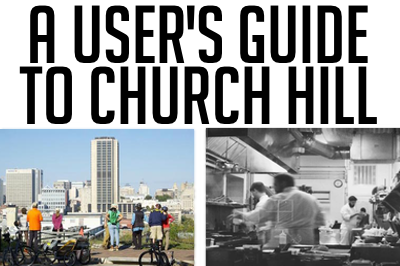RECENT COMMENTS
Gustavo S. on Missing this fella? Updated!
Eric S. Huffstutler on New sidewalk at Clay and 26th Streets
Eric S. Huffstutler on Missing this fella? Updated!
Eric S. Huffstutler on Old water tower is coming down
Public housing leaders express concerns about plans
07/25/2006 10:04 PM by John M
The Richmond Tenant Organization, concerned about RRHA plans to redevelop public housing as mixed income envronments, is organizing towards getting public housing community residents to register to vote. [via]
TAGGED: RRHA






Good. They should register to vote and they should also research the “City of the Future” plan to learn how this could better their lives and the lives of future generations.
What is the “City of the Future”? This plan doesn’t include the 41,000 persons that live in public housing. Where are these residents going?
At the last count, Richmond had 192,494 residents. Are over 20% of Richmond residents really in public housing?
They are going to be disbursed among smaller pockets of subsidized housing (yet to be built) spread all over the greater metro area – in the City and outside of it. The literature supporting this is easy enough to find in the assorted City of the Future documents available to the public.
It’s amazing that the leaders of these places would want to preserve them. No one agrees that tracts of public housing solve anything. The sooner they go, the better for everyone.
HT, they don’t want better lives. They want what they are “entitled” to. The projects are a generational problem and you must first break this cycle. Having to move or better themselves means change and the fact that they may actually have to do something or, God forbid, get a job.
On the RRHA web site they have a demographic report
http://www.rrha.org/html/public/demo.pdf
There are about 10k people living in public housing developments (not including section 8 and other subsidized housing). Anyway, the poverty dispersal policies enacted (most notably the Gatreaux case in Chicago) have not been uniformly positive for adults…displaced kids tend to have better life outcomes due to moving to suburban school districts. But adults seem to be less able to shake a life of, lets call it place-dependency (on the Authority, their neighbors and the local social and religious institutions they use) That said, the other options to improve these developments may seem even more draconian and involve increased work-fare policies, tighter leases that evict for criminal and socially undesirable behavior (truancy for instance). The demographic tables also, to some degree, answers Bob’s rhetoric, in that more than 1/4th of the households in these developments receive a majority of their income through employment. This is not exactly good, but it does mean that some of these folks are working. The real issue, and I think I have wrote this before, is that there are 3700 househholds in these communities, with about 5000 kids, and only 23 married couples. This, more than the physical environment, gives a good clue into the cause- effect cycle of family poverty in these developments.
Every day it amazes me that people enjoy living in projects and are proud of the fact that their families have been there for generations. I grew up in a housing project. My mom was a single mom w/ 4 kids and 2 jobs. Some people honestly need this kind of help but as you know most are simply taking advantage of it. Does the City of the Future Plan include ways to prepare these people for real life? Maybe assist them for a year, raise the rent but put the additional increased amount in a savings plan so that they can purchase their own homes…incentives for working or not getting in trouble? I’m just brainstorming and would like to hear any other ideas floating around.
Thanks!
The complexity of this issue is mind boggling, and I think that is why people want so much to simplify it into a “they” issue. “They” are lazy. “They” are worthless. “They” dont want a better life. “They” dont want a job. etc. etc.
But the fact of the matter is that people (yes people) that live in public housing are more like those of us that dont live in public housing than perhaps some would like to admit. Everyone has their own story, their own family structure and their own set of life experiences.
I do believe that most people want a better life and most people want to be self sufficient. Some people have had it better than others and the road they have taken has been full of opportunity or perhaps less wrought with discrimination and hardship. Some people either havent had the same opportunities, or due to perceptions didnt see them.
I think the first step in this challenge is begin to talk about people, individual families that currently live in public housing. Any plan that discounts the needs and dreams of individual families is doomed to failure. There is no easy “one size fits all” answer-we already tried that and WE failed miserably.
Individuals that choose to lump people together and perpetuate stereotypes are just as much of the problem, as those residents in public housing that meet those expectations.
Peace.
Bill,
I think you’re right. Alot of people see tenants of public housing as numbers or stats and not as real individual living breathing people. That shouldn’t stop people from striving to move forward. I’ve lived it and seen it. Families who’ve lived in these housing projects for generations don’t know anything else. That is their own little world that they are comfortable in and know how to live in. We need to show the up and coming generation that they don’t have to stay there, that they can get a good education, job, house, family and respect.
The RTD’s Michael Paul Williams weighs in with Tenants seek voice in housing.
The Richmond Voice breaks it down in the article RTO demands inclusion from city and RRHA; RRHA and city says RTO is not truthful
Lets solve this sterotype.
Why do people in public housing never pick their trash? If they want improvement, that is the simplest and easiest. I pick up garbage off my street each week.
I agree with ht and Raphael. Bill, just how hopelessly clueless are you?
Steroetypes are so because they are quite often accurate. How many people want project slugs living next door to them as they become dispersed throughout the community?
I’ll guarantee you that our “community leaders” won’t want them next door!
I live in Highland Park, adjacent to the Dove Court project. If you look at the monthly crime reports on the Richmond Police website, you’ll see that much of the drug activity and crime occurs on and very close to that property. The residents in the adjoining neighborhood, comprised of many races, ages and economic groups, would like to see the area redeveloped, and affordable housing mixed into the neighborhood with single-family owned homes. At Councilwoman Robertson’s last monthly Town Hall meeting, the question of how to best address the city’s housing situation was asked. The overwhelming answer, given by a 99% African American audience over the age of 45, was to create mixed income neighborhoods, where folks needing housing subsidies resided side by side with homeowners of all economic and social brackets. This bears out what the residents of Dove Court themselves said when they met with representatives of RRHA. The residents said they did not want to return to a “project” – they wanted to have other housing choices such as vouchers to live in mixed-income neighborhoods. On a national level, HUD, and cities across the country, are finding that concentrations of poverty do nothing constructive for the residents who live in public housing, and so both HUD and city planners are moving away from the “project” model. While it may take a while for folks who have depended on housing in those projects to adjust to living in mixed-income, race and cultural neighborhoods, I believe that the former residents will find that life can be more stable and safe outside those projects. By the way, linking affordable housing to stipulations such as clean crime records and keeping children in school is not “draconian”, it is common sense.
“Steroetypes are so because they are quite often accurate.” -Larry
Thanks Larry.
“Stereotypes are harmful because they are quite often not accurate>” -Bill
Now who is clueless?